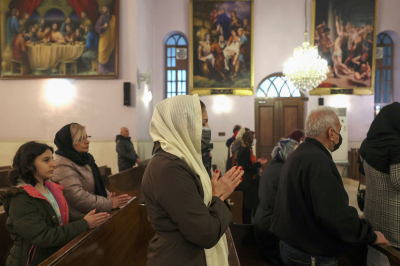
In a nation of nearly 90 million people, over 98% are Muslim, with only a tiny Christian population. But that population is growing, and fast.
Since the 1979 revolution, successive governments’ radical interpretation of Islam has been enforced throughout Iran. Complete submission to the faith of Twelver Ja’afari Shia Islam, the official state religion, comes at a cost few in the West can fully comprehend. This strict interpretation means that other faith groups are outlawed and their followers can face the death penalty.
Even minor deviations or differing views of Islamic law can lead to severe consequences. The tragic death of Zhina ‘Mahsa’ Amini in 2022, who was murdered by the “morality police” for allegedly wearing her hijab “incorrectly,” sparked nationwide protests. The result? Around 20,000 arrests, with some facing the death penalty, for standing in solidarity. Few dare to voice dissent against the regime in an environment regarded as one of the most dangerous places in the world to be a Christian.
Yet, in one of the most difficult places on earth to openly practice the Christian faith, there are glimpses of hope.
There are now more than 1 million Christians living in secret in Iran, the fastest-growing Christian population in the world. While the exact figures are near impossible to attain, this demonstrates a growing hunger for the gospel among this people group.
House churches, gatherings of no more than 15 believers, are on the rise as Christians gather simply and powerfully to worship, pray, and partake in Holy Communion. It’s a sacred gathering that has been central to Christian worship since the first disciples took bread and wine together.
Learning the true cost
Despite Iran being featured on our news channels morning, noon and night, our understanding of what life is really like for a Christian Iranian is, at best, misunderstood; at worst, it involves turning our eyes and ears away from the extreme sacrifices they make daily for the Gospel. Their resilience reflects the faith that Jesus speaks of in the Bible — one that will cost them everything. Many fear that if their faith is discovered, their loved ones will be punished, or that they, or their family, will leave one day, never to return. Cars and phones are bugged; the struggle to find employment is common among Christians as they try to provide for their families; prisons are filled with anyone who speaks out against the regime, including Christians and other minority faiths. To live as followers of Jesus, every move is made with caution and trepidation.
But we are all part of one body, one global Church. As God moves in some of the darkest parts of the world, we must also be ready to listen and learn from what His people in those places can teach us. Their remarkable courage shows us what it means to lay down our lives. While freedom is something we can enjoy and celebrate here in the West, it can also breed complacency. On a Sunday morning, we often seek the best teaching, the most impressive worship, and a community where we feel the most comfortable, with people who look and sound like us. Christians in Iran are striving simply to live another day. But this extremity is strengthening their faith. Just as a stone under extreme pressure transforms into a diamond, faith often deepens and grows during hardship and challenge.
Take Azam’s story. She came from a small village in Iran, and when she became pregnant outside marriage, she was immediately shunned. Honor is a guiding principle in Iranian culture, which, in reality, operates within a shame-based society. This meant Azam was rejected by all who knew her; her family turned their back on her, and her own father even demanded that the baby be left at the shrine of Imam Reza. Yet Azam refused to be defeated and began seeking hope elsewhere. She recalled the story of Mary, the mother of Jesus, also shunned by her culture 2,000 years ago. By chance, Azam met a Christian woman who introduced her to Jesus, the one who bears our shame and died to give us life.
The courage of Iranian believers should instruct us that Christianity is not defined by comfort or infrastructure but by faith that flourishes in adversity. These brothers and sisters cannot attend church; they are the Church. They risk everything for the Gospel, not because they are fearless, but because Christ is worth it.
For Christians in the West, the question is not how to replicate their suffering, but how to recover their clarity and purpose. Their example encourages us to strip away distractions and draws us back to the essence of faith: worship without performance, discipleship without programs, and love without conditions. What would it look like to live with that kind of focus and urgency, even in our freedom?
Connecting with the underground church
Let us be spurred on to support believers, like Azam, all across the globe. At ICM, we strive to place or build a church within walking distance of everyone, everywhere on the planet, and Iran is no exception. Hidden away, the secret church is building momentum. Our indigenous partners are truly a lifeblood to believers in Iran, enacting secure and safe ways to minister to the Church, such as distributing new resources like ingenious micro SD cards that have the words of Scripture preloaded through the Farsi Secret Church Program.
While our involvement may not be life-threatening, we can all pray and become informed, persistent, and expectant through listening, learning, and leveraging our platforms to amplify their stories.
The persecuted church in Iran is not merely surviving; it is thriving and in many ways, leading the global Church. May we have ears to hear what the Spirit is saying through them and the courage to respond.
Janice Allen is the CEO and president of ICM, an international ministry aiming to give everyone on the planet access to a local church.







